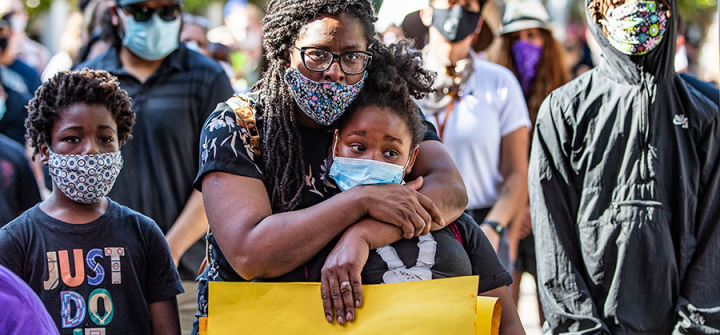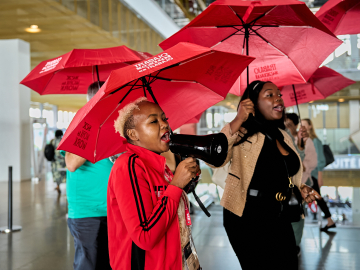Lisa Cooper on Why the Racism Roiling America Is a Public Health Issue
America, reeling from twin crises brought on by police brutality and a virus that takes disproportionate aim at people of color, must now reckon with the racism that paved the path for both.
To understand the challenges, Global Health NOW turned to Lisa Cooper, MD, MPH, a Bloomberg Distinguished Professor and director of the Johns Hopkins Center for Health Equity at the Johns Hopkins Bloomberg School of Public Health.
Also a practicing physician and director of the Johns Hopkins Urban Health Institute, Cooper has spent decades working to make health equity a core principle of all public health work. In this exclusive Q&A, she shares her thinking on racism's role in poor health outcomes for African Americans, why they have suffered more from COVID-19, and the search for solutions.
What do most people not understand about how the persistent experience of racism impacts the health of African Americans, and why is racism is a public health issue?
We just have so much evidence that racism negatively impacts health.
There have been centuries of a system that has created inequities in opportunities for people of color—and for African Americans, in particular—in this country. Having been brought to this country as slaves and subjected to forced labor and atrocities, there is that whole backdrop. And even after emancipation, there were laws put in place that preserved that system of inferiority for an entire race of people.
One really common form of institutional racism in our country has been racial segregation. And those neighborhoods didn’t have social investment, access to healthy food and safe environments from crime, education and employment opportunities, and access to health care. All of those things that determine whether or not people can be successful in society.
There is this myth that America is the land of equal opportunity, but it’s not.
The data on racial differences in health are tragic. Life expectancy for African Americans, for example, is 3.5 years shorter than for white Americans. What other disparities should people be aware of?
It starts from infancy. African Americans also have the highest infant mortality rates. African-American babies die at twice the rate of white babies before their first birthday.
And before birth, maternal mortality rates are about 3-4 times higher for African American mothers. African American children suffer more from conditions like asthma. Death rates from heart disease, diabetes are all much higher among African Americans than whites.
As a physician, have you seen African American patients suffering more?
I see them every week. I see women who are in their 30s who have heart disease, who had a stroke, or who have diabetes and are on the verge of having an amputation, of going blind—women and men of color.
I see young African Americans with kidney failure on dialysis not even 50 years old yet, who are disabled. It’s just incredible. When I see people, I’m often really shocked when they tell me how old they are. I expect them to tell me they’re older than I am, and I find out they’re 10 or more years younger.
Is it a coincidence that we’ve seen massive protests against racism during the COVID-19 pandemic?
I think it’s happening in the backdrop of this pandemic that has already created a lot of additional stresses and hardships on people of color.
People of color are overrepresented among frontline, essential workers, so they’ve been exposed to the virus from having to go to work at a time when a lot of other people can stay home or work from home.
The relationship between law enforcement and communities of color has been problematic for centuries as well.
The data shows that when there’s violence against minority communities by law enforcement, it impacts the mental health of that entire community.
Why are more African Americans dying of COVID-19, and suffering more from hardships related to the pandemic?
Before COVID-19, minority communities were already disproportionately impacted by social inequities. People in those communities already have higher rates of obesity, diabetes, heart disease, lung disease—so these are the folks who were actually going to be at more risk of getting seriously ill with COVID-19. And all the stresses: the financial stresses of being poor, the social stresses of being from a marginalized group with a history of institutionalized, sanctioned mistreatment by law enforcement and other large societal institutions.
There’s a confluence of all these different factors—not having access to food, not having access to good quality housing, crowded in small houses where there are multiple generations, unable to engage in social distancing, stock up on groceries for several weeks at a time, or having to use public transportation.
What can the public health community do to counter stigma against people of color with COVID-19?
What we can do is make the links between social conditions and health clearer.
A lot of the pushback emphasizes individual responsibility. So, if African Americans would just stop overeating and engaging in unhealthy behavior they wouldn’t be in that situation. But it isn’t that African Americans don’t know what they should and shouldn’t be eating, but that society has thrown up obstacles to choosing healthier behaviors.
What can be done right now to ease the toll of COVID-19 on black and minority communities?
Keeping an eye on the data is an important priority: knowing who is impacted, where they’re impacted.
Communication is also really important—making sure that the public understands why we might be seeing these patterns, and that it’s more about our society and the way our resources and opportunities are allocated than it is about individual behaviors. We need to do what we can to better understand the challenges of those communities and show empathy and concern.
We also need to focus on the frontline workers, and the low-wage workers, and understand their needs—providing protective equipment, safe spaces to work, paid sick leave, hazard pay, or health insurance and access to testing and care.
Let’s talk about solutions. Racism is so deeply ingrained in American life and so are the many social and economic inequities. What should the public health community be doing about racism?
We need to bring some of the health equity and social justice aspects of public health more into the mainstream of the curriculum—not just in courses and concentrations. It needs to be brought into all of our work.
Public health can also help set the tone for others to follow—like health care, law enforcement, transportation, housing—by exemplifying those principles in all of our work.
At the Urban Health Institute, our first goal is to facilitate collaborations and offer training and capacity building for academics and for communities to work together toward these evidence-informed strategies and to build “communities of opportunity.”
We’ve developed courses and workshops, and we’re exploring how to enhance them and make them more accessible to more stakeholders.
One thing I’m particularly excited about is the focus on anti-racism training for bystanders; that’s a very promising strategy for changing social norms. If someone is perpetrating racist and biased behavior, ensuring people around them are equipped to respond in such a way that it doesn’t go unchecked.
We’re also working hard to connect the resources of academic institutions and the health care system with policymakers in Baltimore to bring that translation of evidence into policy.
What makes you hopeful about the future?
I see people coming together in a way that they haven’t in a very long time. I see a lot of empathy and connections based on our shared vulnerability at this time.
Even if it seems unprecedented, there have been times in the past that our country and the world went through similar challenges. We are strong and resilient, and we have so many tools at our fingertips now that we didn’t have then. I think that there is hope, and we need to seize on that and not despair.
This is also an opportunity to remember how interconnected we are. Our fates are intertwined. The pandemic has shown us that more than ever that what happens to one of us affects all of us. If we want to be healthier and have more opportunities, it’s not enough to just worry about ourselves. We have to think about how what we do affects other people.
Ed. Note: This interview has been edited for length and clarity.
View GHN’s latest coronavirus news.
For the latest, most reliable COVID-19 insights from some of the world’s most respected global health experts, see Global Health NOW’s COVID-19 Expert Reality Check.
Join the tens of thousands of subscribers who rely on Global Health NOW summaries and exclusive articles for the latest public health news. Sign up for our free weekday newsletter, and please share the link with friends and colleagues: https://www.globalhealthnow.org/subscribe
Allison Bracy of Fontana hugs her daughter Brielle Bracy, 10, at a rally with hundreds of demonstrators to protest the death of George Floyd during the coronavirus pandemic in Riverside, California, June 4, 2020. Gina Ferazzi/Los Angeles Times/Getty





